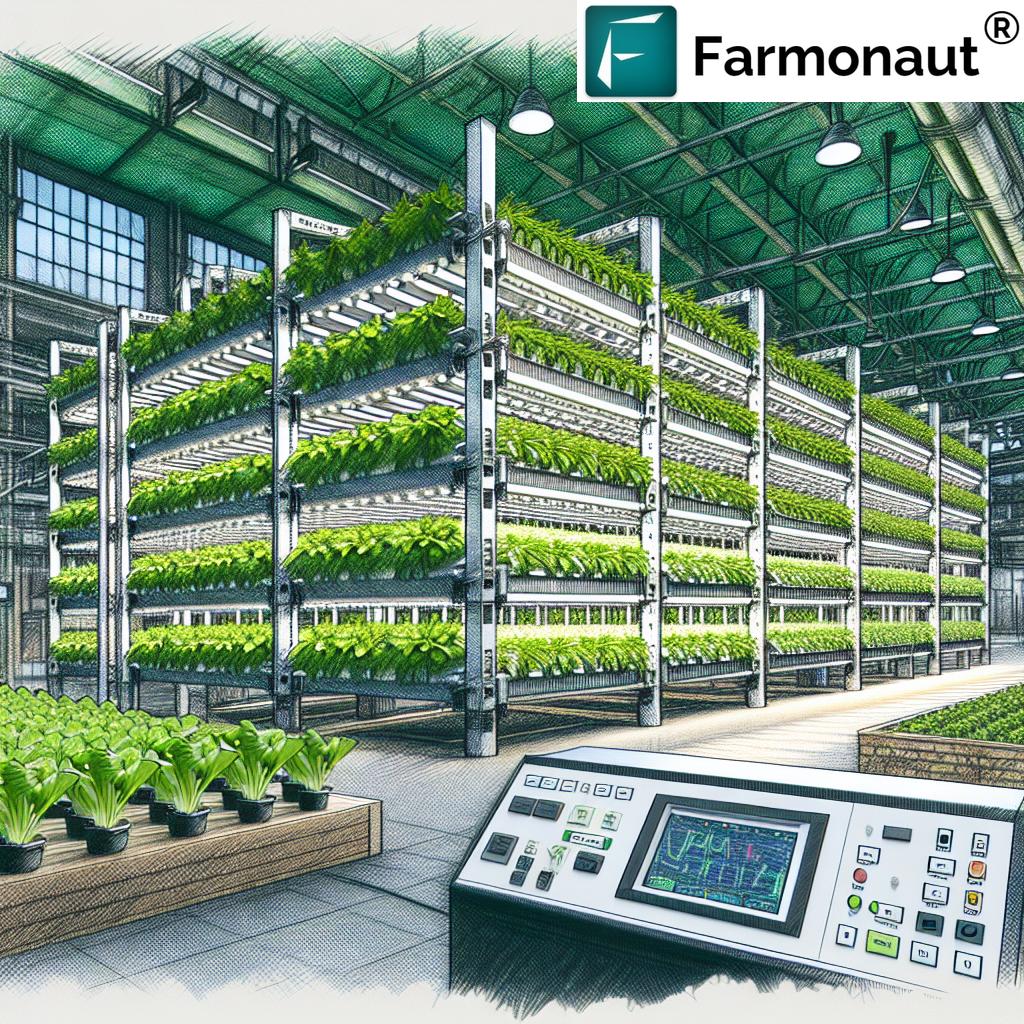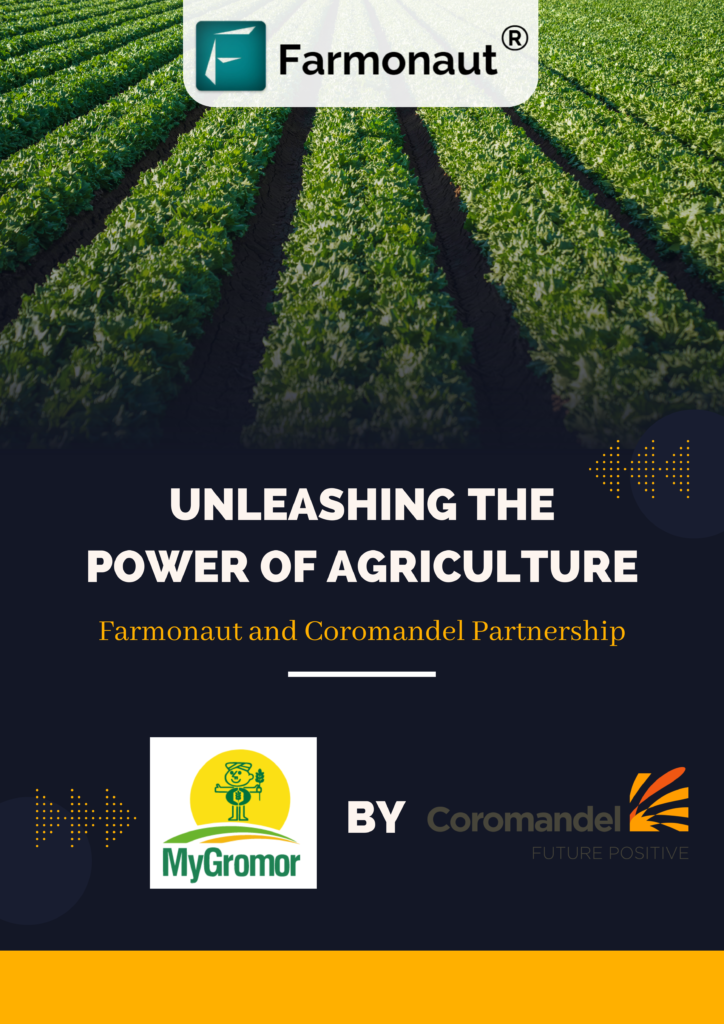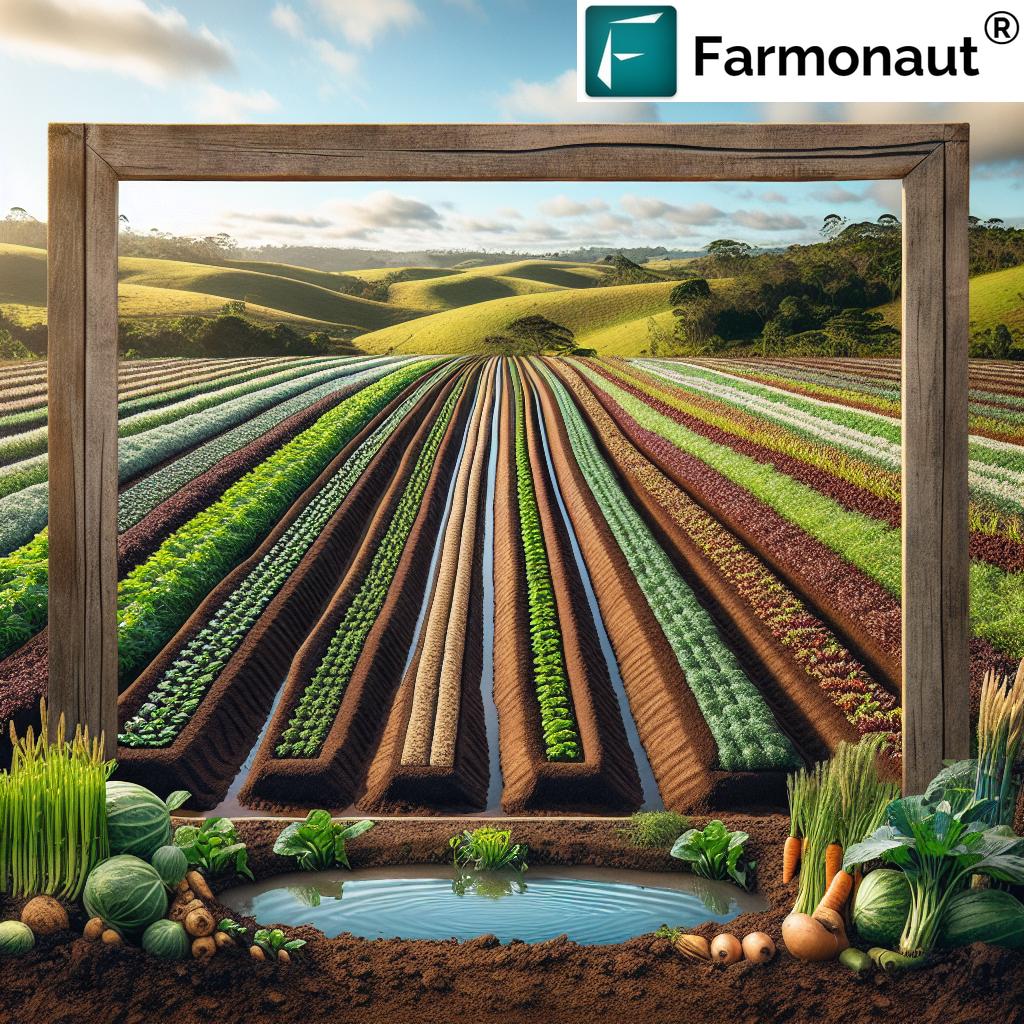Why Is Sustainable Agriculture Important? 5 Key Reasons
“Sustainable agriculture can increase crop yields by up to 79% in developing countries, boosting food security significantly.”
Table of Contents
- What Is Sustainable Agriculture?
- Why Is Sustainable Agriculture Important?
- 1. Environmental Protection and Climate Resilience
- 2. Ensuring Food Security for a Growing Population
- 3. Economic Benefits for Farmers and Communities
- 4. Preservation of Natural Resources
- 5. Healthier Food and Reduced Risk
- Comparison Table: Conventional vs. Sustainable Agriculture
- Looking Ahead: The Role of Sustainable Agriculture in 2025 and Beyond
- Farmonaut: Satellite-Driven Solutions for Sustainable Agriculture
- Frequently Asked Questions (FAQ)
- Summary: Sustainable Agriculture—Why It Is Crucial for the Future of Farming
As we move toward 2025 and beyond, why is sustainable agriculture so important? This question sits at the heart of the ongoing global shift toward resilient, environmentally conscious farming. Sustainable agriculture refers to an approach that fulfills today’s food and textile needs without compromising the ability of future generations to meet their own needs. By balancing environmental stewardship, economic profitability, and social equity, it offers a roadmap for resilient, productive, and equitable farming systems.
Given the ongoing change driven by climate impacts, population growth, and resource limitations, the importance of sustainable agriculture has never been greater. In this blog, we’ll explore what is sustainable agriculture and why is it important, focusing on five compelling reasons why sustainable farming is important for our collective future.
What Is Sustainable Agriculture?
At its core, sustainable agriculture integrates three main objectives:
- Environmental stewardship: Protecting ecosystems, soil, water, and biodiversity through conservation-focused practices.
- Economic viability: Ensuring profitability for farmers and communities, reducing dependency on costly inputs, and promoting stable livelihoods.
- Social responsibility: Supporting fair labor, rural regeneration, and long-term community well-being.
This approach supports productive and resilient systems by encouraging methods such as:
- Crop rotation
- Organic agriculture
- Agroforestry
- Integrated pest management
- Conservation tillage
These practices minimize chemical inputs (fertilizers, pesticides), maintain soil and water health, and support natural cycles—ensuring that farm ecosystems remain productive and adaptable over the long term.
Why Is Sustainable Agriculture Important? (Focus Keyword)
Sustainable agriculture is at the center of meeting food and textile needs without compromising our planet’s resource base. In the sections below, we answer why sustainable agriculture is important by breaking down five essential reasons—each reflecting a pillar of sustainability.
1. Environmental Protection and Climate Resilience
Traditional farming has often caused degradation: soil erosion, depletion of water resources, pollution from synthetic fertilizers and pesticides, and a concerning loss of biodiversity. These negative impacts threaten not just short-term productivity but the future sustainability of agriculture globally.
- Soil health: Sustainable practices like cover cropping, crop rotation, and organic amendments keep soil productive. By boosting organic matter, these methods enhance water retention and prevent erosion—keys for resilience during extreme weather events.
- Water conservation: Sustainable agriculture promotes efficient use of water resources (drip irrigation, mulching), helping to safeguard vital ecosystem services.
- Reduced chemical inputs: By minimizing synthetic fertilizers and pesticides, runoff and waterway pollution are diminished, protecting aquatic and terrestrial biodiversity.
- Climate action: Sustainable farming helps mitigate climate change by sequestering carbon in soils, reducing greenhouse gas emissions, and fostering adaptation to climate variability.
Did you know? Monitoring and reducing agriculture’s carbon footprint is vital for sustainability. That’s why Farmonaut’s Carbon Footprinting platform empowers farmers, agribusinesses, and governments to track carbon emissions using affordable satellite data, helping users reduce environmental impact, comply with climate goals, and adopt truly sustainable practices.
How Sustainable Practices Enhance Environmental Protection
- Cover Cropping & No-till: Reduces erosion, retains soil carbon, and supports beneficial organisms.
- Buffer Strips & Wetlands Restoration: Traps chemical runoff and protects waterways.
- Diverse Crop Systems: Builds biodiversity at multiple levels (plants, pollinators, microbes) for healthy agroecosystems.
- Agroforestry: Integrates trees/shrubs—improves resilience, sequesters carbon, and supports more wildlife.
2. Ensuring Food Security for a Growing Population
By 2025, global population will exceed 8 billion—escalating demand for food. There is mounting pressure on land, water, and natural resources as traditional agriculture struggles with diminishing returns and climate extremes.
- Maintaining yield stability: Sustainable agriculture supports crop diversity and healthier soil, both of which are critical to resilient farming—even under unpredictable climate events.
- Food safety and nutrition: Organic and sustainable farming reduce dependency on synthetic inputs, resulting in safer, more nutritious food for consumers.
- Supporting food systems globally: Sustainable practices create redundant and robust food systems—guarding against crop failures from pests, weather, or market shocks.
-
Learn about Farmonaut’s Product Traceability solution
—ensuring authenticity of agricultural products using blockchain technology. This feature helps meet rising global demands for food transparency and safety, especially critical as globalization increases. -
Farmonaut’s Crop Loan and Insurance verification
—provides vital satellite-based verification for reliable crop loan processing and risk reduction. This benefits both farmers and financial institutions by safeguarding livelihoods and improving access to essential agricultural credit.
Ensuring Food Security Through Sustainability
Sustainable agriculture promotes reliable harvests, reduces risk of food shortages, and ensures that present and future generations can meet their needs without exhausting the Earth’s resources. In 2025 and beyond, this resilient approach is vital for reducing hunger and building strong, adaptable global food systems.
“Healthy soils from sustainable farming store up to 20% more carbon, helping fight climate change.”
3. Economic Benefits for Farmers and Communities
Sustainable agriculture isn’t just eco-friendly—it’s economically rewarding. By reducing dependency on costly synthetic inputs and encouraging resource optimization, farmers can improve profitability while supporting economic stability for rural communities.
- Lower input costs: Sustainable farming cuts fertilizer and pesticide costs and harnesses natural nutrient cycles.
- Diversified income sources: By incorporating crop diversity, agroforestry, and integrated pest and resource management, farmers reduce dependency on single cash crops, making them more economically resilient.
- Fair labor and community support: Sustainable systems foster healthier, more equitable rural economies—benefiting farm workers and local businesses through fair employment and participatory practices.
- Risk reduction: Integrated pest and crop management reduces losses from pests and diseases, stabilizing income in the face of unpredictable events.
- Farmonaut’s Fleet Management tools help optimize agricultural logistics, reducing operational costs and ensuring that vehicles and machinery are used efficiently—crucial for large-scale, sustainable farm operations.
- Our Large Scale Farm Management platform supports agribusinesses in monitoring resources and optimizing field operations at scale, enhancing both profitability and sustainable land stewardship.
How Sustainable Approaches Bolster Rural Economies
- Reinvestment: With reduced input expenses, farmers can reinvest in soil health, technology (precision agriculture), and community strengthening.
- Stable Markets: Crop diversification insulates producers against price crashes and external disruptions.
4. Preservation of Natural Resources
Agriculture uses an estimated 70% of global freshwater and constitutes the largest transformation of natural landscapes worldwide. Sustainable practices are essential for protecting and conserving natural resources—ensuring not just present-day productivity, but also that future generations can meet their needs.
- Water efficiency: Drip irrigation, rainwater harvesting, and scheduled watering improve water-use efficiency and reduce depletion of aquifers.
- Soil conservation: Cover crops, reduced tillage, and organic amendments protect against erosion and degradation.
- Biodiversity conservation: Agroforestry and buffer strips create wildlife corridors and preserve on-farm biodiversity, promoting healthier agro-ecosystems.
- Maintaining ecosystem services: Pollination, nutrient cycling, and pest regulation are actively supported in sustainable farming, ensuring that agricultural lands remain productive over the long term.
- Farmonaut’s Crop Plantation & Forest Advisory App supports effective resource stewardship, from plantation health monitoring to forest management—ensuring better conservation and resilience.
Why Conservation Is Crucial
Without investing in soil, water, and biodiversity, modern farming cannot remain productive. Resource conservation is not a luxury but a necessity to sustain agriculture, rural communities, and natural habitats long term.
5. Healthier Food and Reduced Risk for Farmers and Consumers
Sustainable agriculture emphasizes natural and organic methods, benefiting both farmers and consumers by:
- Minimizing exposure to harmful chemicals (synthetic pesticides, fertilizers)
- Improving food safety—reducing contamination in crops, water, and livestock
- Increasing nutritional quality through better soil health and greater crop diversity
- Reducing health risks and chronic illnesses linked to chemical residues
How Sustainable Farming Protects Health
Strict avoidance or reduction of harmful chemicals safeguards farm workers from acute and chronic poisoning, while consumers receive safer, more wholesome food. Emphasis on nutrient cycling leads to higher vitamin and mineral content in foods.
Comparison Table: Conventional vs. Sustainable Agriculture—5 Key Aspects
| Aspect | Conventional Agriculture (Estimated Value/Note) |
Sustainable Agriculture (Estimated Value/Note) |
|---|---|---|
| Food Security | Yields can be high but vulnerable to pests, soil exhaustion, climate shocks | Yield stability is higher; crop yields in developing regions can increase by up to 79% (per sustainable methods) |
| Soil Health | Loss of up to 30 tons/ha of soil annually in intensive systems; declining organic matter | Healthy soils, store up to 20% more carbon, higher organic matter, and improved fertility |
| Environmental Impact | High greenhouse gas emissions; heavy chemical runoff and pollution; biodiversity loss | Reduced emissions, minimal runoff, biodiversity supported via habitat conservation |
| Economic Viability | High reliance on chemical inputs; often subject to price shocks; profit margins volatile | Lower input costs, diversified income, resilient to market fluctuations; supports rural economies |
| Resilience to Climate Change | Low resilience; frequent crop losses in droughts or floods; poor adaptive capacity | High resilience—diverse systems, better water retention, integrated management (essential for climate adaptation in 2025+) |
Looking Ahead: The Role of Sustainable Agriculture in 2025 and Beyond
As the pressures of climate change, resource limitations, and global population growth increase, sustainable agriculture is not optional—it is urgent and essential. Governments, researchers, farmers, and consumers must work together to:
- Promote policies that reward conservation, innovation, and long-term sustainability
- Advance education, equipping the next generation of farmers and agri-professionals with sustainable skills
- Embrace technology—from precision agriculture, renewable energy integration, to satellite-based solutions
- Reduce food loss and waste at every point along the value chain
In 2025 and beyond, why is sustainable agriculture so important? Because only systems rooted in conservation, resilience, and community can weather tomorrow’s environmental and economic storm. Farming is not an isolated activity—it shapes the health, nutrition, and well-being of billions.
Farmonaut: Satellite-Driven Solutions for Sustainable Agriculture
As a satellite technology leader, we at Farmonaut empower sustainable agriculture by making satellite-driven insights affordable and accessible for farmers, businesses, and governments worldwide.
- Real-time Monitoring: Satellite imagery tracks soil health, crop conditions, and environmental impact, allowing swift responses to adverse events and resource depletion.
- AI-Based Advisories: Our Jeevn AI system combines weather and field data, enabling precision steps to enhance productivity and mitigate risks—driving profitability and sustainability.
- Blockchain Traceability & Transparency: Product traceability builds trust between producers and consumers, securing supply chains and ensuring authenticity.
- Environmental Monitoring: Our carbon footprint tracking helps verify sustainable practices, assisting compliance with climate targets.
- Fleet & Resource Management: We help optimize logistics, reducing costs and minimizing waste for larger-scale and multi-site agricultural businesses.
Take advantage of our powerful API for seamless integration, or explore the developer documentation to create custom solutions for sustainable food production.
We are dedicated to supporting the shift required to produce and manage our agricultural systems sustainably in 2025 and beyond.
Frequently Asked Questions (FAQ) About Sustainable Agriculture
1. What is sustainable agriculture and why is it important?
Sustainable agriculture refers to farming practices that meet current food needs without compromising the ability of future generations to meet theirs. It balances environmental health, economic viability, and social responsibility—ensuring ongoing productivity and minimized negative impacts.
2. Why is sustainable farming important in 2025 and beyond?
Sustainable farming is crucial because it offers resilience against rapid climate change, resource limitations, and a growing population. It’s the only path toward food security, economic stability, and a healthy environment.
3. What are key sustainable agriculture practices?
Practices include crop rotation, biological pest management, conservation tillage, agroforestry, and organic inputs. These support soil health, biodiversity, water conservation, and reduce chemical dependency.
4. How does sustainable agriculture help reduce climate change impacts?
By improving soil carbon sequestration, reducing emissions, and increasing resilience to weather extremes, sustainable farming directly contributes to global climate mitigation and adaptation efforts.
5. Can sustainable agriculture benefit both large and small farmers?
Absolutely. Sustainable agriculture improves economic prospects, reduces input costs, diversifies income, and supports community development—benefiting farmers of all scales.
Summary: Sustainable Agriculture—Why It Is Crucial for the Future of Farming
To answer the core question—why is sustainable agriculture so important?—it’s clear that for 2025 and beyond, sustainability in agriculture is not just a trend. It is a global imperative. By safeguarding our soil, water, and biodiversity, reducing chemical inputs, and supporting rural economies and food security, sustainable agriculture provides the only viable pathway to ensure a healthy planet and food security for all.
As technologies like satellite monitoring and AI advisory evolve, and as consumers and governments demand more accountability, the future of farming will be defined by practices that are environmentally sound, economically viable, and socially responsible. We at Farmonaut are committed to advancing these sustainable solutions and supporting every stakeholder in the food chain.
Explore More With Farmonaut:
- Farmonaut Carbon Footprinting – Reduce and monitor carbon emissions on your farm.
- Farmonaut Product Traceability – Ensure food safety and authenticity from field to fork.
- Farmonaut Fleet Management – Optimize logistics and resource use efficiently.
- Farmonaut Crop Loan and Insurance – Access reliable satellite-backed credit verification.
Sustainable practices today mean secured harvests, healthy environments, and thriving rural communities tomorrow. The time for change is now.













